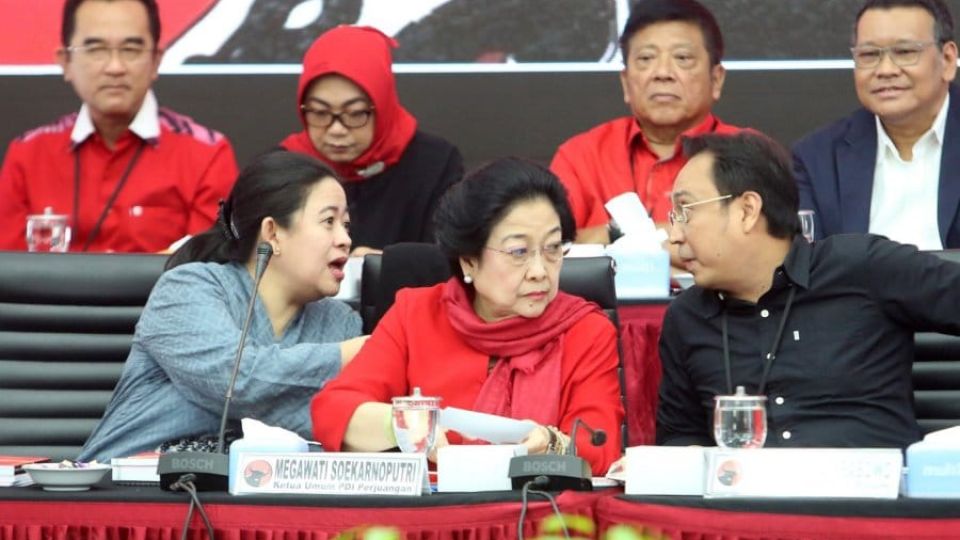May 17, 2023
JAKARTA – Indonesian politics appears to have increasingly become a family affair, with relatives of political elites and sitting governors, mayors and Cabinet ministers running for seats at the House of Representatives, cementing the reign of political dynasties in the country.
At least three political heirs have been confirmed to be running in the upcoming legislative race, including Diah Pikatan Orissa Putri Hapsari, known as Pinka Hapsari, the daughter of the House of Representatives Speaker Puan Maharani and the granddaughter of the ruling Indonesian Democratic Party of Struggle (PDI-P) chairwoman Megawati Soekarnoputri.
Megawati, the daughter of Indonesia’s first president, Sukarno, is the first woman to serve as president of Indonesia, while Puan is the first woman to serve as House speaker.
An international relations graduate from SOAS University of London, Pinka, who has no previous experience as a politician, has hinted at her interest in politics to her grandmother before she, along with her brother Praba Diwangkata Caraka Putra Soma, was first introduced to the public and party members by Megawati during the party’s 50th anniversary earlier this year.
Prinka, who is set to follow in the footstep of both her mother and grandmother in politics, would become the youngest legislative candidate nominated by the party, secretary-general Hasto Kristiyanto said last week.
“The party continues to recruit through political education and regeneration and the recruitment process comes from the family. It is a culture that has been built not only in Indonesia, but in the United States, in Singapore, in Europe. Political parties, which are the pillars of democracy, recruit from families,” Hasto said.
Prinka’s nomination was in line with the party’s desire to add a younger generation to the party, Hasto said, adding she had undergone a political education and ideology school hosted regularly by the party, the same requirement other party members had fulfilled.
Another family member of political elite running for House seats is Futri Zulya Savitri, the daughter of the National Mandate Party (PAN) chairman Zulkifli Hasan, who now holds a position as trade minister in President Jokowi’s Cabinet.
Both Zulkifli and Futri received a backlash last year after a video of the minister seen distributing free cooking oil in Lampung while asking recipients to vote for his daughter went viral on social media.
Family members of regional leaders have also joined the fray, such as Yani Ardian, the wife of Bogor, West Java, mayor Bima Arya, both of whom are PAN politicians, and Atalia Praratya Kamil, the wife of West Java Governor Ridwan Kamil.
Both the Crescent Star Party (PBB) leader Yusril Ihza Mahendra and his son Yuri Kemal Fadlullah also ran for the upcoming race as the party sought to build a new strategy by placing the party’s prominent figure at the party’s strongholds.
“We hope they will be elected so we can pass either the 4 percent of seats requirement or 4 percent of the votes in the upcoming election,” Yusril said on Saturday.
Other family member of political elites joining the race include Titiek Soeharto, the daughter of the late dictator Soeharto and former wife to Gerindra Party leader Prabowo Subianto, who will contest on Gerindra Party’s ticket.
Titiek joined Golkar in 2012 and was able to win a seat in the 2014 legislative election before he opted to join Berkarya Party, a party her brother Tommy Soeharto founded in 2016 and eventually left.
Firman Noor, a senior political researcher of the National Intelligence Agency (BIN), noted the trend had indicated the party’s failure at developing a meritocracy-based regeneration in the pursuit of a more-instant electoral boost.
“Parties that have experienced difficulties in finding candidates who have sufficient social and financial capital to campaign eventually took a shortcut by nominating figures who have a kinship with sitting regional leaders and lawmakers,” Firman said.
Aside from producing party members with a quality that is not up to par, the practice, if left unchecked, would cement the elite’s place in the power holder and turn the country’s democracy into a “country of the elite, by the elite and for the elite”, he added.
“The public will eventually be left out and policymaking processes will only revolve around the interest of the elites.”
A recent survey by the research arm of Kompas daily has found widespread dissatisfaction with the paltry work done by the House of Representatives, as 76.2 percent of 500 people polled in April were not happy with the work done by current members of the House.
Part of the reason for the high dissatisfaction was 84 percent of respondents felt lawmakers had been prioritizing the interests of their own political parties, rather than what was good for the general public when making decisions. (ahw)


